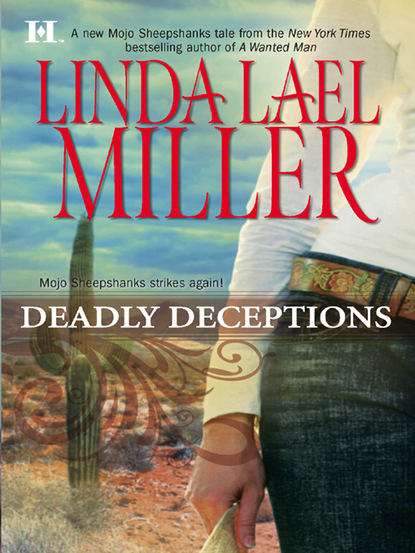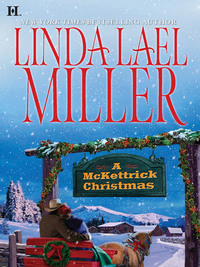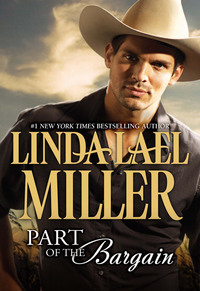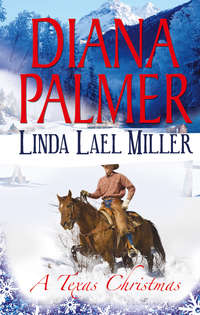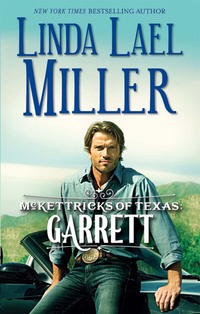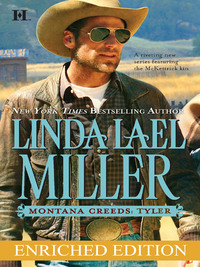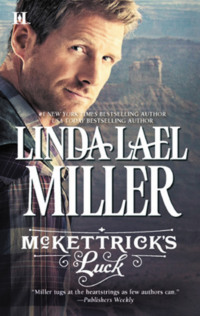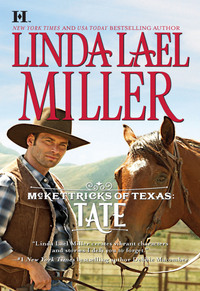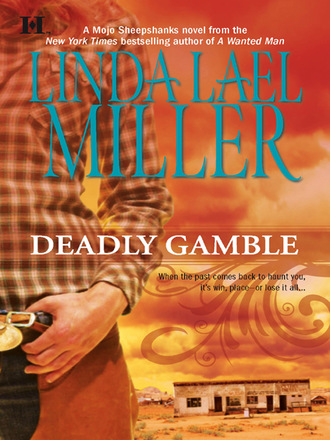
Полная версия
A Mojo Sheepshanks Novel

Linda Lael Miller
Deadly Gamble

MILLS & BOON
Before you start reading, why not sign up?
Thank you for downloading this Mills & Boon book. If you want to hear about exclusive discounts, special offers and competitions, sign up to our email newsletter today!
SIGN ME UP!
Or simply visit
signup.millsandboon.co.uk
Mills & Boon emails are completely free to receive and you can unsubscribe at any time via the link in any email we send you.
For Joan Marlow Golan with love,
admiration and appreciation.
Thanks.
CONTENTS
CHAPTER 1
CHAPTER 2
CHAPTER 3
CHAPTER 4
CHAPTER 5
CHAPTER 6
CHAPTER 7
CHAPTER 8
CHAPTER 9
CHAPTER 10
CHAPTER 11
CHAPTER 12
CHAPTER 13
CHAPTER 14
CHAPTER 15
CHAPTER 16
CHAPTER 17
CHAPTER 18
CHAPTER 19
CHAPTER 20
CHAPTER 1
Cave Creek, Arizona
At first, the chill was a drowsy nibble at the distant and ragged edges of my awareness, raising goosebumps on the parts of my flesh bared to that spring night. The sensation was vaguely disturbing, but not troublesome enough to stir me from the fitful shallows of sleep. I remember rolling onto my side, pulling the comforter up to my right earlobe and murmuring some insensible protest.
That was when I heard Nick’s voice. Or thought I heard it.
Impossible, I told myself, nestling groggily into my polyester burrow. He’s dead.
Just then, a hand came to rest on my hip, and the chill sprouted teeth and bit right through cotton nightshirt, skin and tissue to seize the marrow of my bones.
I choked out a hoarse cry, too raw and guttural to qualify as a scream, and shimmied off the mattress to land hard on both feet. In the space of an instant, my senses shifted from dial-up to broadband, and I pressed one hand to my chest, in case my heart tried to flail its way out of my chest. My brains pulsed, Cuisinart-style, then scrambled. I couldn’t seem to drag a breath past my esophagus, though my lungs clawed for air like a pair of miners trapped beneath tons of rubble.
I felt that way once on a stair-climber at the gym after sucking in a pack and a half of nicotine in a bar the night before, and subsequently swore off exercise forever. Hell, somebody has to serve as the bad example.
But I digress. Get used to it.
My eyes must have bugged out, cartoonlike. Nick—Nick—lay on top of the covers, dressed in his snappy gray burial suit, with his hands cupping the back of his head. Except for a peculiar greenish glimmer emanating from his skin, he looked pretty much the way he had before he collided with a semi on the 101 North and was thrown through the windshield of his BMW. Along with Tiffany, Nick’s lover du jour, who was scarred for life and for some insane reason blamed me for her Frankenstein face and deflated implants.
One of the many things I don’t like about dead people is that a lot of them glow in the dark. Not that I’d seen any before my late ex-husband turned up that momentous night, a full two years after his funeral. Since then, unfortunately, I’ve become something of an authority.
“Hey,” Nick said companionably, as though the situation were entirely normal, and not something out of an old segment of Unsolved Mysteries.
My stomach quivered. Like my heart, it was threatening to leap out of my throat and make a run for it.
“You’re dead,” I pointed out—quite reasonably, I thought, given the circumstances. I knew he’d croaked, but I wasn’t sure he’d been notified. He looked so calm and matter-of-fact, as though turning up in his ex-wife’s bed in the middle of the night was a perfectly ordinary thing to do.
Nick sighed, slipped his hands from behind his head and hoisted himself as far as his elbows. “Sort of,” he admitted, with a rueful note.
I managed a step backward, ready to hot-foot it out of there, jerk open the outside door, and dash down the fire escape–style stairway to Bad-Ass Bert’s Biker Saloon. Normally, I didn’t seek out the company of Bert’s clientele, especially when I was naked except for a slip of cotton jersey that barely covered my thighs, but given the situation, I was game for just about anything. Trouble was, once I’d retreated half a stride, I couldn’t seem to move again.
“How can you be ‘sort of’ dead?” I asked.
“It’s complicated,” Nick replied. “In some ways, I’m more alive than you are.” With that, he swung his legs over the side of the mattress and stood up, turning to face me across the expanse of tangled bedding. The glow surrounding his lean frame flickered a little, as if somebody had turned a celestial dimmer switch.
“Relax,” he said. “It’s okay.”
Sure. No problem. Pay no attention to the walking, talking corpse.
“You’re dead,” I repeated stubbornly.
“Yeah,” he agreed wryly. “I’ve noticed. So maybe we could get past that?”
“Don’t come near me,” I ordered. Pure bravado, of course. I’d read The Damn Fool’s Guide to Self-Defense for Women and practiced all the moves on Bert, who was a genuine bad-ass, but if there was a chapter on phosphorescent assailants, I must have missed it.
Nick tilted his dark head to one side and looked pathetic, though still damnably handsome. Apparently, being deceased was neither messy nor strenuous; his suit was wrinkle-free, if slightly out of fashion, his hair sleek, and there was no sign of his hallmark five o’clock shadow. No tire marks, either, thank God, and no blood, guts or jutting bone fragments.
He must have read my mind. With a sad grin, he looked down at himself, before meeting my gaze again. “Hell of a patch job, though. You should have seen me before the mortician did his thing.” He shuddered. “You haven’t lived—so to speak—until you’ve seen yourself lying in pieces on a slab. Definitely not a pretty sight.”
I winced. “Thanks for sharing,” I said. At least we were on the same page with the dead-thing. I had a lot of questions, naturally, but I couldn’t seem to articulate any of them. Shock does that to a person.
Another fetching grin. “You cried at my funeral,” he reminded me, with pleased modesty.
I stiffened. My heartbeat had slowed somewhat, and I was managing a full breath every few seconds, but my knees felt about as substantial as foam on a mug of draft beer. When the last few bubbles popped, I’d be on the floor in a quivering heap.
“So what?” I asked. “We were married once. You were only thirty-two, and you didn’t deserve to die like that, even if you were an asshole. Too bad about Tiffany, too. Did you know her boobs popped and she had to have three surgeries just to look human?”
He ignored the reference to girlfriend #62. At least she was post-divorce; the first thirty-seven could probably be slotted neatly between “I do” and “Go-to-hell-you-bastard-I’m-taking-back-my-maiden-name.”
“Black isn’t your color,” he observed gently, starting around the end of the bed, heading in my general direction.
I backpedaled. “Stay away from me.”
He stopped, and once again that slight, familiar grin hitched up one corner of his mouth. “You looked for all the world like the classic grieving widow that day,” he reiterated. “Divorce or no divorce, you weren’t over me.”
“The hell I wasn’t,” I shot back, and shoved a hand through my shoulder-length tangle of curly red hair. I did a quick mental review of The Damn Fool’s Guide to Lucid Dreaming and wondered if I was experiencing some random version of the phenomenon. I pinched myself, blinked a couple of times and sighed.
Nick remained still there, which meant I was awake. The jury was still out on whether or not I was lucid.
“I’m sorry about the other women,” he said sweetly.
“Too little, too late,” I answered, stunned by the sharp, sudden pang of sorrow at the verbal reminder. It was like a rubber band snapping around my soul. “What are you doing here?”
He cocked one perfectly shaped eyebrow. In life, Nick had been a real estate developer, eating up the Arizona desert with tract houses, convenience stores and strip malls. I half expected his cell phone to ring. He was one of those people who go around with an earphone plugged into their heads, apparently talking to themselves. “I wondered when you’d get to that question,” he said.
“Now you know.”
Nick fiddled with his tie again. His mother chose that tie—red, with tiny silver stripes. I hated it, and I hated her. More on that later. “It’s hard to get your attention,” he said. Then, with a wistful look, he added, “Some things never change.”
“Pul-eeze,” I said. “We’re not going to play the poor, misunderstood Nick game, okay?” I was so not in love with him, dead or alive, and I didn’t want him hanging around. How do you get a restraining order against a ghost?
He held up a hand, palm out. “All right, all right,” he said. “Let’s not go there.”
“Wise choice, Bucko. And you still haven’t told me what you’re doing in my bedroom in the middle of the night.”
“It’s a long story.” He looked around the bedroom, with its linoleum floor, fading wallpaper and garage-sale furniture. “Still living over the biker bar,” he observed. “When are you going to get a decent place?”
Thanks to Nick and his mother, Margery DeLuca, society scion and barracuda divorce lawyer, I’d gotten F-all in the settlement, except for a pile of credit card bills I was still paying off. I couldn’t afford anything but what I had, and sometimes even that much was a stretch, but there didn’t seem to be much point in going down that winding and treacherous road. “Did you come here to talk real estate? If so, kindly go haunt somebody else—your mother, for instance. I’m not in the market.”
Nick looked hurt. That was my second cue to feel guilty.
Not.
He sighed once more, philosophically this time, like some holy martyr, angling for his own prayer card. No sale there, either. Nick DeLuca was a lot of things, but a saint wasn’t one of them.
“Damn it,” he said, looking down at himself again. “I’m fading.”
Sure enough, the glow indicated low batteries, and I could see through his left shoulder and part of his mid-section.
“Wait,” I said. The word scraped my throat.
Nick’s brown eyes connected briefly with mine, then he vanished.
I blinked, hugging myself now, ready to collapse but afraid to go near the bed, where I could expect to make a soft landing. “Nick?” I whispered, gripping the dresser for support.
No answer.
He was really gone, except for a faint reverberation in the air.
If he’d been there in the first place.
I stood still for a long time, staring at the space where Nick had been standing, then groped my way out of the bedroom, along the dark hall and into the kitchen, flipping on the light switch with numb fingers as I passed it. I sank into a chair at the round oak table, laid my head down on my folded arms and sat out the rest of the night.
AT DAWN, I made a pot of coffee, and as soon as I heard Bert’s Harley roll up outside, I forced myself to go back into the haunted bedroom. There, I quickly pulled on a pair of jeans, stuffed my feet into the Sponge Bob slippers my foster sister, Greer, had given me for Christmas in one of her rare moments of whimsy, and finger-combed my hair. In the adjoining bathroom, I brushed my teeth and splashed my face with cold water. Gazing into the mirror over the cracked pedestal sink, I gave myself a brief lecture.
“Suck it up, Mojo Sheepshanks,” I said. “You’re probably not the first woman to wake up and find her dead husband in bed with her.”
Despite the speech, I wasn’t consoled. My face was so pale, my freckles looked three-dimensional, and my eyes, which vary from blue to green, depending on what I’m wearing, were colorless. I had the raccoon thing going, too—an effect that can usually only be achieved by cheap mascara and a crying jag.
Having made this grim but accurate assessment, I turned from the mirror, traversed the kitchen again and opened the door. I stood for a moment on the landing, looking down on the gravel parking lot. Bert, a brawny guy with a shaved head and both arms tattooed with road maps, bent over the sidecar attached to his bike, unbuckling Russell’s helmet. Russell was his basset hound, and the mutt gave a happy yip when he spotted me.
Bert Wenchal—Bert being short for Bertrand—turned and favored me with a broad smile. For all that he could have been an attraction in one of those road-side freak shows advertised on billboards—See the Amazing Human Map, 5 Miles Ahead—Bert had perfect teeth, never mind that they were the size of piano keys, and baby blue eyes.
“Hey, Mojo,” he called, setting the dog’s head gear on the seat of the Harley. Russell leaped out of the sidecar and trundled toward me as I descended the wooden stairs. Most days Russell sat on a stool at the end of the bar, and scored too many pepperoni sticks from the customers.
I bent to ruffle the dog’s floppy ears. “You’re too fat,” I told him affectionately.
He tried to lick my face.
Bert’s keys jingled as he shoved one into the lock on the service door. The bar wouldn’t open until ten, but he liked to come in early, put the coffee on to brew, fire up the hot dog roaster, rake the peanut shells, cigarette butts and spit-lumps out of the sawdust on the floor and balance the till. As landlords went, Bert was unconventional, but the rent was right and he had a great dog, so we got along okay.
“You look like hell this morning,” he told me brightly, washing his hands at the sink behind the bar. Bert was proud of his saloon, especially the bar. It was nothing but splintery boards, nailed across the top of six huge wooden barrels, bought at a junk sale in Tombstone, but according to Bert, the thing was a true historical artifact. Allegedly, in its heyday, the likes of Wyatt Earp and Doc Holliday had bellied up to it.
“Thanks,” I said bleakly. Russell climbed onto the old mounting block next to his bar stool, then made the leap to the vinyl seat. I perched on the next one over.
Bert started the coffee. Despite his size and the fact that Route 66 coursed in a green line up his left arm, presumably across his chest, and down his right, complete with side roads, highway numbers and place names beside little red circles, he was a sensitive guy.
“Something happen to Lillian?” he asked.
My eyes burned, and my throat tightened. I ran a hand down Russell’s broad back for a distraction. Lillian Travers was the closest thing I had to a mother, and she would have been my first choice to confide in, but she’d suffered a devastating stroke six months before. Now, she sat staring into space in a Phoenix nursing home, and I made the forty-five-minute trip to visit her three times a week.
Sometimes Lillian seemed to know me, sometimes she didn’t. Except for isolated, garbled words, she never spoke.
Bert paused in his coffee-making, waiting.
I finally shook my head. “She’s the same,” I got out.
“Then what?” Bert persisted, but gently. With the coffeemaker chortling and belching out fragrant steam, he flipped on the hot dog machine, opened the fridge tucked behind the bar and took out a package of frankfurters. I watched as he laid them carefully, one by one, on the gleaming steel bars rolling behind the glass.
“Something really weird happened last night,” I said, with understandable difficulty and no little reluctance. Russell laid his muzzle on my left forearm, mesmerized by the spinning wieners.
Bert arched his eyebrows, tossed the frankfurter package into the trash and washed his hands again. Time to rake the sawdust. I took comfort in Bert’s unvarying rituals, maybe because I had so few of my own. Most of the time, I felt as insubstantial as Nick’s ghost; I’d been living a lie for so long, I couldn’t recall the truth, if I’d ever known it in the first place. “Like what?” he prompted.
I turned on the bar stool as he reached for the rake leaning against the weathered board wall. “Like I saw my dead ex-husband last night,” I stumbled. There was no graceful way to say it.
Bert paused, rake in hand and gave a low whistle. “Dude,” he said.
Since some people would have tested my forehead for a fever, I was mildly encouraged. “Maybe I’m going crazy.” That was the thought that had kept me awake, too agitated to engage in my usual insomnia cure, which was to sit at my computer and work my way through one of the piles of medical billings that paid my bills. That and the fear that Nick would get a recharge and show up again if I lay down on the bed.
Bert began to rake noxious things into a pile between two massive pool tables. Anybody might think they were losing their mind if they’d seen what I had, but I had more reason than most. My parents were shot to death in our rented double-wide, down in Cactus Bend, when I was five years old. I knew I must have witnessed the murders, since I was found hiding in the clothes dryer off the kitchen, covered with their blood, but I had no memory of the incident, or of the next few months, for that matter. The first thing I could recall was waking up in a cheap motel, and Lillian dabbing at my face with a cold washcloth.
“I seen you do some strange things,” Bert said. “Like the way you can make a slot machine pay off pretty much whenever you want. You come by your name honestly, but you ain’t crazy, Mojo. Not you.”
My heart warmed. Actually, I didn’t come by my name honestly—or much of anything else, either. Like Lillian, I’d been using an alias for years—one I’d chosen myself, out of a library book—and some dead child’s social security number. As close as Bert and I were, though, I’d never told him the whole story. Even Nick hadn’t known, though maybe he did now. He’d seen his battered body after the accident, and he knew I’d cried at his funeral, so maybe being dead gave him a broader perspective.
Now there was a disturbing thought.
“He looked—real,” I went on. “Except that he glowed in the dark.”
Bert raked a little faster, and I hoped he wasn’t revising his opinion about my sanity. “Was there a reason for this visit?” he asked, without looking at me.
“We never got that far,” I said.
Bert glanced in my direction.
“Nothing happened,” I told him firmly, and without delay.
He grinned. “I never said it did,” he replied. “Give Russell one of them frankfurters, will you? He missed his breakfast.”
I slid off the stool and went around behind the bar, glad to have something physical to do, however mundane. “You shouldn’t let him eat stuff like that,” I said. “One of these days, he’s going to blow an artery.”
Bert got out the dustpan and leaned down to rake the pile into it. “Poor dog gets nothin’but diet kibble at home,” he said. Bert’s girlfriend, Sheila, ran a tight ship. “One sausage ain’t gonna hurt him.”
I opened the door, speared a frank and plopped it onto a paper plate.
Russell watched, salivating, as I cut it into bite-sized pieces with a plastic knife. “Like you don’t give him one every morning of his life,” I chided, but I set the plate down in front of Russell and smiled as he snarfed up the grub.
“My aunt Nellie saw a ghost once,” Bert ruminated, raking again. “It was her dog, Fleagel the beagle. He lived for seventeen years, and Nell swore she found crap on the same old place on the stairs for ten days after he croaked. She said that was how she knew she was going to die. When the beagle came back, I mean. Sure enough, a few weeks after the sighting, she bit the dirt, right in the middle of a game of blackout bingo.”
I gazed across the bar at him, hands resting on my hips. With anybody else, I would have felt self-conscious in my jeans, rumpled nightshirt and Sponge Bobs, but Bert was different. Like a brother. “That was a pretty insensitive remark,” I said.
“Aunt Nellie was a pretty insensitive woman,” Bert answered, without missing a beat. “If Uncle Dutch hadn’t been too embarrassed to call the cops on her, she’d have been run in on a domestic violence charge. The only thing she ever loved, far as I could tell, was that dog of hers.”
I returned to my stool but sat facing Bert, with my back to the bar. “We both come from dysfunctional families,” I reflected. “Maybe that’s why we get along so well.”
Bert chuckled, shook his bald head. “You know what worries me, Mojo? I can follow your logic, back-asswards as it is. Your brother went to prison for killing your folks. I was raised by two drunks and a pack of Labrador retrievers. We’re a pair to draw to, you and me.”
I nodded glumly. Bert’s knowledge of my background was limited to the bare facts, but I’d told him more than I’d told just about anybody else in my life, including Nick or the men I’d dated since the divorce. “By psychological standards, we ought to be in padded rooms by now.”
“If you mention seeing a ghost to the wrong person,” Bert mused, pausing to lean on the rake handle and regard me with concern, “you might end up in one anyhow.”
By then, my thoughts had shifted to Lillian. Maybe she was having one of her good days. Even if she was, she wouldn’t be able to carry on a coherent conversation, but she could listen, and she always seemed to enjoy a surprise visit. I decided to shower, dress and motor down the 101 to see her.
“You’re a real comfort, Bert,” I teased, already on my way to the side door, which stood propped open to the still cool mid-April air. In another month, it would be so hot the asphalt on the highways would buckle.
“You didn’t have your coffee,” Bert called after me.
I doubled back, filled a disposable cup, stirred in sugar and powdered creamer and raised the brew in a toast as I went by. “Put it on my tab,” I said.
Bert grinned and nodded, and I stepped out into the sunny parking lot just as another Harley roared up, flinging gravel, and came to a noisy stop beside Bert’s bike.
Tucker Darroch, my most recent bad romantic choice.
He shut off the bike and gave a salutelike wave. Clad in jeans, scuffed black boots and a blue muscle shirt, which showed off his biceps to distinct advantage, Tucker was the complete opposite of Nick, at least when it came to appearance. He was six feet tall, square jawed, and his honey-colored hair was too long, falling in his eyes and curling at the nape of his neck, while Nick was of average height, compactly built and born to the boardroom.
Tucker looked like a Hell’s Angel. In actuality, he was an undercover cop.
We’d done a little undercover work ourselves, Tucker and I. That was the best part of our relationship. The rest of it sucked, unfortunately, and we’d agreed, three and a half weeks before, to cool it for a while. Tucker was just wrapping up a nasty divorce, and he and the little woman were still duking it out over custody of their seven-year-old twins, Danny and Daisy.
Just watching Tucker swing a blue-jeaned leg over the seat of that bike made my nerves twitch. I wanted to nod a noncommittal greeting, climb the stairs to my apartment and go on about my business, but I might as well have been wearing cement shoes.
Tucker approached, his hips rolling in that easy, death-to-women walk of his. He shoved his hair back from his face and looked straight down into my eyes. “Nice getup,” he said, hooking his thumbs in the back pockets of his Levi’s.
It took me a moment to realize he was talking about my clothes. “It’s a fashion statement,” I heard myself say. “Care for a translation?”
He grinned. “I’ll pass,” he said lightly, but his green eyes were watchful, and slightly narrowed. “You okay? You’ve got dark circles under your eyes.”


